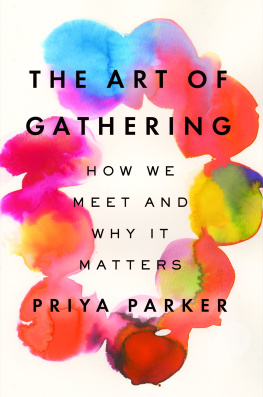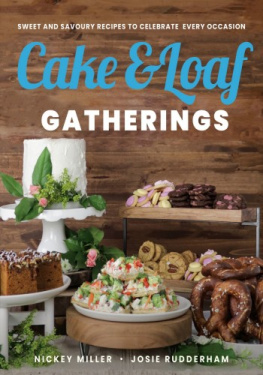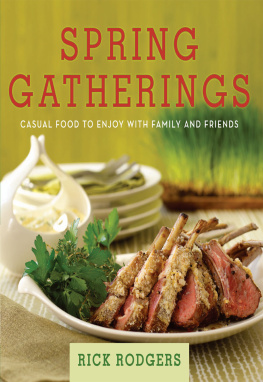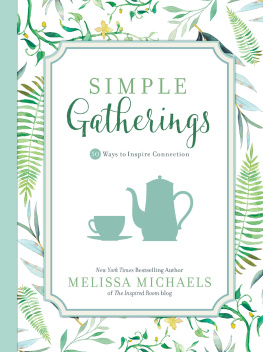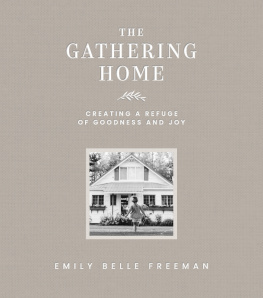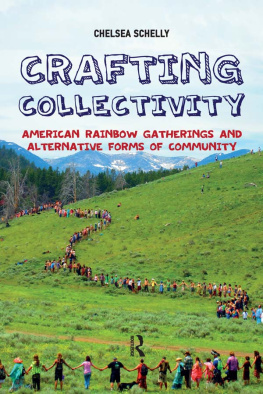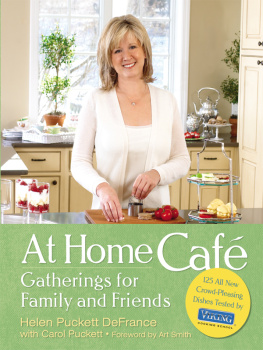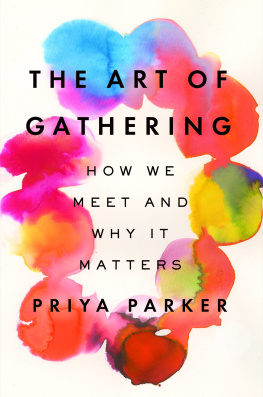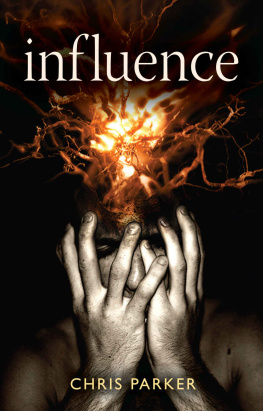Penguin supports copyright. Copyright fuels creativity, encourages diverse voices, promotes free speech, and creates a vibrant culture. Thank you for buying an authorized edition of this book and for complying with copyright laws by not reproducing, scanning, or distributing any part of it in any form without permission. You are supporting writers and allowing Penguin to continue to publish books for every reader.
Names: Parker, Priya, author.
Title: The art of gathering: how we meet and why it matters / Priya Parker.
Description: New York: Riverhead Books, 2018.
Identifiers: LCCN 2017058605| ISBN 9781594634925 (hardback) | ISBN 9780698410879 (ebook)
Subjects: LCSH: Self-actualization (Psychology) | Interpersonal relations. | BISAC: SELF-HELP / Personal Growth / General. | BUSINESS & ECONOMICS / Leadership. | PSYCHOLOGY / Interpersonal Relations.
Introduction
The way we gather matters. Gatherings consume our days and help determine the kind of world we live in, in both our intimate and public realms. Gatheringthe conscious bringing together of people for a reasonshapes the way we think, feel, and make sense of our world. Lawgivers have understood, perhaps as well as anyone, the power inherent in gatherings. In democracies, the freedom to assemble is one of the foundational rights granted to every individual. In countries descending into authoritarianism, one of the first things to go is the right to assemble. Why? Because of what can happen when people come together, exchange information, inspire one another, test out new ways of being together. And yet most of us spend very little time thinking about the actual ways in which we gather.
We spend our lives gatheringfirst in our families, then in neighborhoods and playgroups, schools and churches, and then in meetings, weddings, town halls, conferences, birthday parties, product launches, board meetings, class and family reunions, dinner parties, trade fairs, and funerals. And we spend much of that time in uninspiring, underwhelming moments that fail to capture us, change us in any way, or connect us to one another.
Any number of studies support a notion thats obvious to many of us: Much of the time we spend in gatherings with other people disappoints us. With the occasional exception, my mood in conferences usually swings between boredom, despair, and rage, Duncan Green, a blogger and specialist in international development, confesses in the Guardian. Greens take isnt unique to conferences: The 2015 State of Enterprise Work survey found that wasteful meetings were employees top obstacle to getting work done.
We dont even seem to be thrilled with the time we spend with our friends. A 2013 study, The State of Friendship in America 2013: A Crisis of Confidence, found that 75 percent of respondents were unsatisfied with those relationships. Meanwhile, in How We Gather, a recent report on the spiritual life of young people, Angie Thurston and Casper ter Kuile write, As traditional religion struggles to attract young people, millennials are looking elsewhere with increasing urgency.
As much as our gatherings disappoint us, though, we tend to keep gathering in the same tired ways. Most of us remain on autopilot when we bring people together, following stale formulas, hoping that the chemistry of a good meeting, conference, or party will somehow take care of itself, that thrilling results will magically emerge from the usual staid inputs. It is almost always a vain hope.
When we do seek out gathering advice, we almost always turn to those who are focused on the mechanics of gathering: chefs, etiquette experts, floral artists, event planners. By doing so, we inadvertently shrink a human challenge down to a logistical one. We reduce the question of what to do with people to a question of what to do about things: PowerPoints, invitations, AV equipment, cutlery, refreshments. We are tempted to focus on the stuff of gatherings because we believe those are the only details we can control. I believe thats both shortsighted and a misunderstanding about what actually makes a group connect and a gathering matter.
I come to gatherings not as a chef or an event planner, but as someone trained in group dialogue and conflict resolution. Ive spent much of the past fifteen years of my life studying, designing, and advising gatherings whose goals were to be transformative for the people involved and the communities they were trying to affect. Today I work as a professional facilitator. Though there are many of us around, you may have never heard of us. A facilitator is someone trained in the skill of shaping group dynamics and collective conversations. My job is to put the right people in a room and help them to collectively think, dream, argue, heal, envision, trust, and connect for a specific larger purpose. My lens on gatheringand the lens I want to share with youplaces people and what happens between them at the center of every coming together.
In my work, I strive to help people experience a sense of belonging. This probably has something to do with the fact that I have spent my own life trying to figure out where and to whom I belong. I come on my mothers side from Indian cow worshippers in Varanasi, an ancient city known as the spiritual center of India, and on my fathers side from American cow slaughterers in South Dakota. To cut a very long story short, my parents met in Iowa, fell in love, married, had me in Zimbabwe, worked in fishing villages across Africa and Asia, fell out of love, divorced in Virginia, and went their separate ways. Both of them went on to remarry, finding spouses more of their own world and worldview. After the divorce, I moved every two weeks between my mothers and fathers householdstoggling back and forth between a vegetarian, liberal, incense-filled, Buddhist-Hindu-New Age universe and a meat-eating, conservative, twice-a-week-churchgoing, evangelical Christian realm. So it was perhaps inevitable that I ended up in the field of conflict resolution.
I discovered that field in college when I became interested in, and anguished by, the state of race relations at the University of Virginia. Upon graduating, I worked in communitiesin the United States and abroadto train leaders in a group dialogue process called Sustained Dialogue. It is a gathering technique that aims to transform fractured relationships across racial, ethnic, and religious lines. Through that work, I became fascinated with what occurs when people attempt to come together across difference.
In the years since, I have applied the methods of conflict resolution in a variety of settings and to a great variety of problems. Ive run meetings in five-star hotels, in public parks, on dirt floors, and in college dorm rooms. Ive led sessions with villagers in western India grappling with how to rebuild their community after ethnic riots and with Zimbabwean activists fighting the threat of a government shutdown of their NGOs. Ive worked on dialogues between Arab opposition leaders and their European and American counterparts to explore the relationship between Islam and democracy. Ive designed gatherings for state and federal officials in the United States to figure out how to revitalize a national poverty program for a new generation. Ive facilitated gatherings for technology companies, architecture firms, beauty brands, and financial institutions, helping them hold complicated, difficult discussions about their future.

